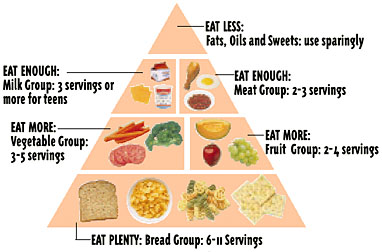 
Prepared by
Diane Ball Linder, EdD, LDN, RD
We all want to be able to take care of ourselves in our old
age by staying as mobile as we can for as long as we can. Maintaining healthy bones is
very important in preventing bone fractures and in staying more mobile. Minerals play a
key role in bone health.
|
|
Click here for the printable (Word) version of the lesson
Getting the Minerals We Need- A Very Serious
Matter
Introduction
Do you want to be as healthy as you can when you get older? Do you want to stay at about
the same height as your normal adult height, or do you want to become much shorter and
maybe stooped over some? Do you want your bones to stay as dense as possible and be less
likely to fracture, or do you want your bones to become more porous and break more easily?
Hip fractures cause the greatest health problems and the greatest number of deaths. Half
of all elderly adults hospitalized for hip fracture cannot return home or live
independently after the fracture. Breaking a hip is one of the leading causes of
admissions into a nursing home. Elderly people are more likely to die within six months to
one year once they have broken a hip, greatly due to the immobility and complications
arising from immobility as well as the increased strain on the heart and other body
organs. We all want to be able to take care of ourselves in our old age by staying as
mobile as we can for as long as we can. Maintaining healthy bones is very important in
preventing bone fractures and in staying more mobile. Minerals play a key role in bone
health.
For us to stay mobile, we also need to keep our muscles in good, working order. We can do
that by getting the minerals we need through eating mineral-rich food and being physically
active to improve strength, mobility and flexibility. Minerals are important for muscles
to function. Muscles can't contract without certain minerals.
Minerals are also important for our heart and circulatory system to function as it should.
Minerals are important for our heart to beat regularly and to help prevent a buildup of
fluid in our feet or other body parts. Excessive fluid buildup increases the work-load on
our heart.
Are you like many Americans and don't eat enough fruits, vegetables, milk and other foods
that are our best sources of minerals, an important group of nutrients? Minerals do so
much for us, yet good food sources are often low or missing from the food we eat. We need
to think about the kinds of foods that we eat and be sure to include mineral-rich foods
such as fruits, vegetables, milk and other foods.
We want to be as healthy as we can be for as long as we live, yet not eating foods that
give us minerals can result in our having bones that become brittle and break easily,
contribute to heart complications and can give us problems with swelling in our feet, legs
or other parts of our body.
What You Will Learn
In this lesson, you will learn about the two main groups of minerals - major minerals and
trace minerals. You will learn why minerals are important. You will also learn which foods
are the best sources of the minerals. You will learn about the minerals that are required
to be on the nutrition label - sodium, calcium and iron.
Food Guide Pyramid
Review
A balanced diet that provides a variety of foods is the best guarantee of our getting all
essential nutrients. All food groups should be included, and none should be overused. Use
the USDA Food Guide Pyramid in planning the foods you will eat each day. Get the
recommended number of servings from each food group since no food group contains all of
the nutrients needed.

What
Are Minerals?
Minerals are a group of nutrients needed by your body. They are important in regulating
body processes and in giving your body structure. Have you ever experienced swelling in
your fingers, ankles or feet? Minerals have an important role in keeping a healthy fluid
balance. Minerals are also needed for your muscles to work or contract and for impulses to
be carried over the nerve pathways. Certain minerals also help form bones. Bones make up
the structure of your body. With such important jobs, we need to be sure to eat foods rich
in this important group of nutrients.
Minerals can be classified into two main groups, based on how much you need. You need all
the minerals, though, no matter whether you need just a little or need more. Major
minerals are those needed in amounts of more than 250 milligrams (mg) daily. Calcium,
phosphorus and magnesium are in this group, along with three electrolytes - sodium,
chloride and potassium. Trace minerals are those needed in very small or trace amounts of
less than 20 mg daily. These include chromium, copper, fluoride, iodine, iron, manganese,
molybdenum, selenium and zinc. This lesson will focus on the minerals required on the
nutrition label. They include sodium, calcium and iron.
 Issued in furtherance of Cooperative Extension
work, Acts of Congress of May 8 and June 30, 1914, in cooperation with the United States
Department of Agriculture. The Louisiana Cooperative Extension Service provides equal
opportunities in programs and employment. Information and Graphics on this site are
copyright protected by LSU Agricultural Center's Louisiana Issued in furtherance of Cooperative Extension
work, Acts of Congress of May 8 and June 30, 1914, in cooperation with the United States
Department of Agriculture. The Louisiana Cooperative Extension Service provides equal
opportunities in programs and employment. Information and Graphics on this site are
copyright protected by LSU Agricultural Center's Louisiana
Cooperative Extension Services.
For more information on the EFNEP program, contact EFNEPMail@agcenter.lsu.edu. |